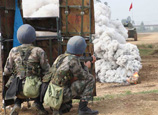
The U.N. General Assembly has recently passed a resolution to restart negotiations on the Arms Trade Treaty (ATT) in March 2013, after failing to reach a final agreement in July 2012. Owing to the geo-political influence and great profits brought by the arms trade, it has long been just a dream of kind people to limit or regulate global arms trade through international law and mechanisms. The purpose of the ATT is to impose internationally accepted restrictions on global trade and transfer in conventional arms, so human beings will not get hurt. Objection from any of the 193 U.N. member states would block the passage of an ATT clause, so it is extremely difficult to reach an agreement on the final text of the treaty.
Moreover, major arms exporters and importers as well as countries plagued by illegal weapons differ on the content, methods, and standards of arms trade regulation. The United States and some other major arms exporters refused to ratify the treaty, but many small and medium-sized countries consider it necessary for the treaty to cover these arms exporters. As victims of the proliferation of small arms and light weapons, many countries in Africa and the Caribbean have called for regulating the sale and transfer of such weapons, but certain major powers and medium-sized countries do not agree. In terms of the transfer standard, Western countries suggest that democracy, good governance, and human rights should be set as the standards for approving arms exports, but the forced promotion of Western values is unlikely to gain the support and response from developing countries.
Furthermore, different countries have their own interest considerations over the arms trade. At present, annual global arms trade stands at more than 100 billion U.S. dollars, and the treaty is aimed at regulating 60 percent to 70 percent of global arms trade. Arms trade can bring great economic benefit, which cannot be ignored in the context of the weak U.S. economic recovery, prolonged European debt crisis, and Russia's expanding budget deficit. The United States is the world's largest arms exporter, and the ATT involves such a sensitive issue as U.S. gun control and is bound to damage the interests of U.S. arms dealers. Related interest groups will spare no effort to pressure the U.S. government to reject the treaty so as to protect their interests.
However, the international community has made great efforts in the ATT, and any country rejecting the treaty would face enormous diplomatic pressure and lose moral points. Therefore, no country will easily say no. Whether they will fully observe the treaty after its passage is another story. Although international law tries to stick to the high moral standards of human beings, people tend to accept only the lowest possible level of moral regulation.
Read the Chinese version: 《武器貿易條約》前景如何?, source: China Military Online, author: Li Hong














 This group of photos engrave the "past" left far behind us. For some, we may not even have chance to say goodbye.
This group of photos engrave the "past" left far behind us. For some, we may not even have chance to say goodbye.


![]()
